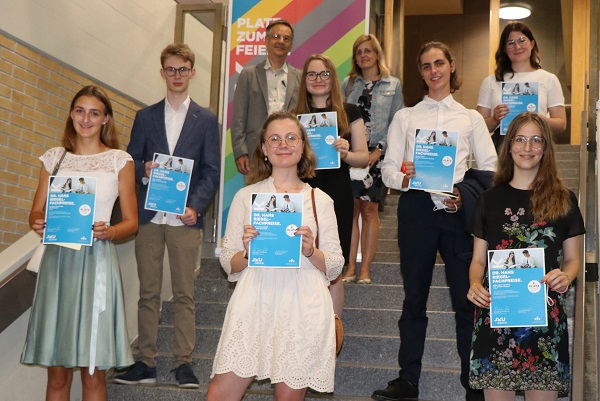Together with the Kaiserschild Foundation, the JKU presented the annual Hans Riegel Awards in recognition of outstanding academic work by school students.

Together with the Kaiserschild Foundation, the Johannes Kepler University Linz presented this year’s Hans Riegel Awards on Tuesday, June 29, 2021, in recognition of outstanding pre-academic work. A total of 65 papers were submitted by AHS high school students this year and reviewed by a jury of experts.
For the eleventh year, the authors of the best three pre-academic papers in different subject areas (chemistry, mathematics, physics, biology, and computer science) were presented with an award endowed with a total amount of €5,500 in prize money. Graduating high school students from throughout Upper Austria were encouraged to submit their pre-academic paper and once again, students submitted outstanding work.
This year, the jury selected seven female students and five male students. The gifted students focused on, among other things, Albert Einstein’s life, work and legacy, using the Cepheid method to measure distance in space, holistic healthcare, caring for premature babies, chess mathematics, and comparing machine learning algorithms for autonomous vehicles applications.
Sparking an Interest in Research
O. Univ. Prof. DI Dr. Kurt Schlacher, Dean at the Faculty of Engineering & Natural Sciences at the JKU, remarked: "The Covid-19 pandemic did not curb the students’ enthusiasm when it came to taking part in the 2021 Dr. Hans Riegel Awards to honor outstanding pre-academic papers in STEM subjects that include biology, chemistry, physics, computer science, and mathematics. The award-winning papers not only focused on scientific questions, but addressed these questions using very sophisticated methods. Knowledge and action based on proof are cornerstones that give a pluralistic, open and tolerant society an opportunity to thrive. We need committed, hard-working and very critical school students and university students who can think in a scientifically rational, knowledge-based way and apply their findings to benefit everyone. We would be happy to welcome all of the participants to the JKU Faculty of Engineering & Natural Sciences in the future!"
The Kaiserschild Foundation is committed providing support to young teens in the so-called MINT subject areas. The Dr. Hans Riegel Awards were created to not only encourage gifted young people to pursue higher education and career in areas of natural sciences or engineering, but also provide a connection between schools and the university by supporting exchange and introducing the winning students to the university system early on. Univ. Prof. Dr. Markus Achatz, a board member at the Kaiserschild Foundation, added: "The Dr. Hans Riegel Awards gives the Kaiserschild Foundation a way to honor outstanding pre-academic papers and encourage high school students to pursue a career in a MINT area. In addition, during studies, award winners can take advantage of special events and focused seminars as well inter-regional networking opportunities."
Experimenting and Critical Analysis
Once again, students had an opportunity this year to present their research findings to a panel of experts consisting of JKU faculty members. The criteria to win the award includes the quality of textbook research, student-conducted experiments, and a critical examination and reflection of the conducted experiments.
The awards for each subject area are endowed with prize money in the amount of € 600 for first-place winners, € 400 for second-place winners, and € 200 for third-place winners. In addition, the first-place winners’ schools and respective educators received prizes in the amount of € 250 in recognition of supervising the academic work.
The winners in the individual categories:
Mathematics
- 1st Place: Stefanie Haimböck, BG/BRG Enns, on the topic „Schachmathematik - Logische Problemstellungen und deren Lösungsmethoden“
- 2nd Place: Michael Hollnbuchner, BRG Linz, Fadingerstraße, on the topic „Mathematische Beschreibung starrer Graphen und Analyse ihrer Eigenschaften“
- 3rd Place: Magdalena Wögerbauer, BRG Rohrbach, on the topic „(Un)bewusste Fehler im Umgang mit Statistik“
Physics
- 1st Place: Moritz Mayr, Bischöflichen Gymnasium Petrinum Linz, on the topic „Entfernungsmessung im Weltraum mit der Cepheiden-Methode“
- 2nd Place: Simon Gruber, Europagymnasium Baumgartenberg, on the topic „Leben, Wirken und Vermächtnis Albert Einsteins”
- 3rd Place: Felix Nerger, BRG Linz, Hamerlingstraße, on the topic „Industrielle Computertomographie zur Porenanalyse von kohlenstoff-verstärkten Materialproben“
Chemistry
- 1st Place: Melina Wiesinger, BG/BRG Enns, on the topic „Daktyloskopie und Blutspurenanalyse in der Kriminaltechnik“
- 2nd Place: Ada Stockhamer, BG/BRG Gmunden, on the topic „Polymerchemie - Eigenschaften und Synthese von Polymerisaten“
Computer Science
- 1st Place: Moritz Grammer, BG/BRG Linz, Ramsauerstraße, on the topic „Vergleich von Machine Learning - Algorithmen zur Anwendung in autonomen Fahrzeugen“
Biology
- 1st Place: Anja Schwab, BG/BRG Freistadt, on the topic „Memory Masters: Committed to Memory - Scientific Evidence for the Efficacy of Mnemonic Techniques“
- 2nd Place: Rhea Mayr-Geister, BRG Schloss Wagrain, on the topic „Forensische Datierung des Todeszeitpunktes anhand necrophager Insekten“
- 3rd Place: Antonia Engleder, BORG Bad Leonfelden, on the topic „Ganzheitliche Pflege und Betreuung von Frühgeburten“








